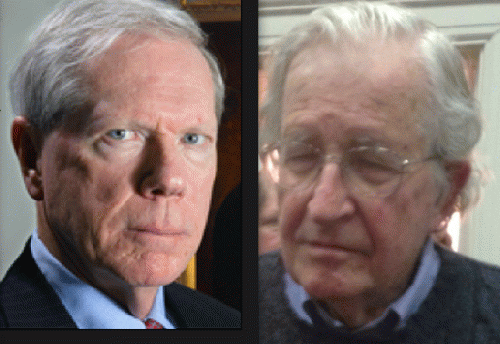The second and final part of the transcript of my conversation with Paul Craig Roberts and Noam Chomsky Here's a link to the audio podcast.

Paul Craig Roberts and Noam Chomsky
(Image by Paul Roberts image from Paul Roberts, Chomsky image by Rob Kall) Details DMCA
Rob: Now, my next question, well, is going to be about climate change. What role will climate change play in the future of economics and world power balances? Why don't you keep going Noam.
NC: Well, if current tendencies persist, we are reaching a point where there'll be a substantial rise in sea level, inundating coastal planes -- that could mean millions of people dying in Bangladesh, inundating cities -- most major cities are coastal cities -- in Boston, New York, San Francisco, others...
PCR: Miami...
NC: Yeah, Miami -- much worse in the global south typically. We're already at a level of species extinction that is comparable to what happened 65 million years ago when a huge asteroid hit the earth and ended the age of the dinosaurs and opened the possibility for small mammals to survive...ultimately us. That level of species extinction is now being matched and it's going to increase. All of these are really catastrophic consequences, unpredictable in fact. You can't even talk about the global economy -- it's going to have far more harmful consequences than that. And it's not that far off. We're marching toward the precipice.
Rob: I have to wonder, will...there are some people and companies that seem to want this to happen. What will happen to the economy, to the world, and the power balance in the world?
NC: Well, I think this goes back to a point that Paul made. Take say, Exxon Mobil...you know, biggest energy corporation. I mean, it's not that they want these catastrophes to happen. It's that the logic of the institutional framework in which they function is almost compelling them, unless there are external pressures, to march toward that precipice. They have recently announced, Exxon Mobil, that they are going to intensify their focus on fossil fuel extraction instead of alternatives because it is simply so much more profitable.
Chevron, another major energy corporation, had a small sustainable energy program that was doing ok -- it was profitable, but they just shut it down because the profits are so much greater on extraction of fossil fuels. Within the given institutional logic, you can't really blame the managers and directors for choosing these options -- they simply have no choice within that framework, or very little choice. There was a day when Henry Ford could manage the considerations that Paul was talking about -- he could see I've got to pay the workers $5.00 per hour or else there won't be anybody to buy my cars. But there aren't...the contemporary institutions don't allow that.
Next Page 1 | 2 | 3 | 4 | 5 | 6 | 7 | 8 | 9 | 10 | 11
(Note: You can view every article as one long page if you sign up as an Advocate Member, or higher).





